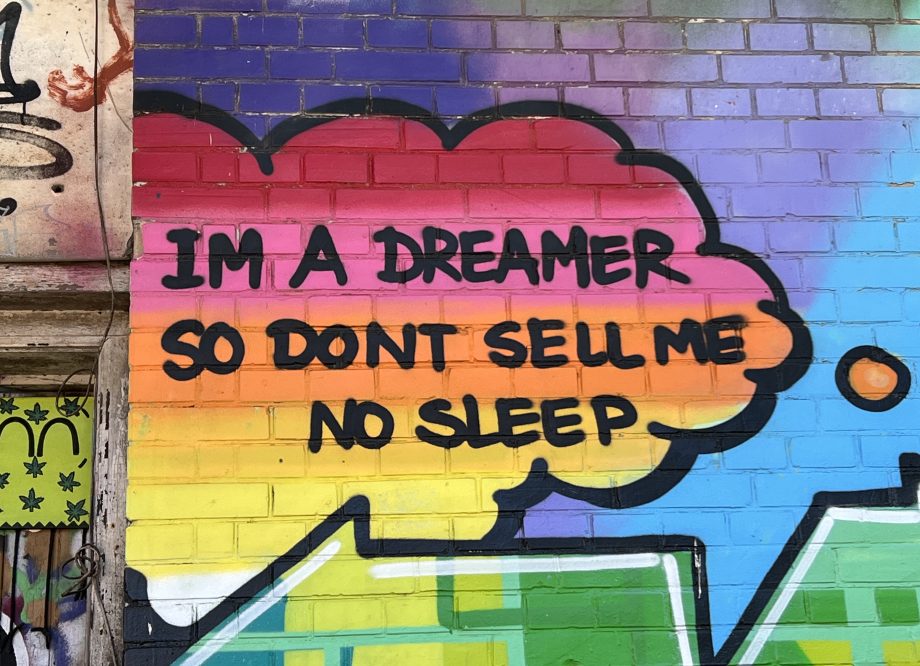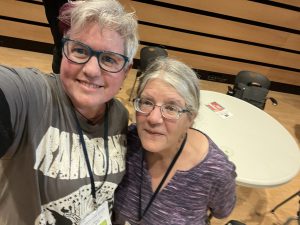As with #OER23 I’m going to say here that I plan to write more blog posts about #ReclaimOpen in due course (yet to happen for #OER23) but I want to capture a few key thoughts and takeaways from the event before they slip away from me.
Scale is the thing
#ReclaimOpen was the perfect conference in that it was small, but deeply thoughtful. Everyone was there because we share some common sense that the open web is important, but we were by no means a homogenous group. That led to some really great discussions and conversations with many different perspectives represented, even in small sessions. I especially appreciated Chip Germain’s contributions during our OSPO unconference session. To have the perspective of an erst-while CIO was invaluable.
We reflected on the benefits of slowing down and working at human scale across a number of sessions, and throughout I was hearing echoes of adrienne marie brown’s work on small scale repeating patterns, the key to having significant impact at human scale. #ReclaimOpen was that – many small sessions that added up to something really impactful – for me at least.
The drive for scale seems to have become to scourge of our age. Mass education at the expense of meaningful relations and genuine community; AI operating at the scale of planetary effects. I have many more thoughts that I need to sit and digest properly.
People are the real infrastructure
Another key takeaway was the sense that sustainability comes from investing in people (and I would argue edtechs in particular). Technologies come and go and it’s people who help usher them in and out of our institutions, smoothing over the cracks as needed. But our drive to “efficiency” and “scale” sees us investing much less in people and more in technology (and buildings). People sit on the wrong side of the balance sheet in our institutions – operating costs and therefore “liabilities”. Martha Burtis asked “How do we turn people into buildings?” which was a 100% lolsob moment.
Cutting edge configurations
Minimal computing was a recurring theme, with Lee Skallerup Bessette challenging us to think about what tech was truly necessary, and Tom Woodward extolling the accessibility and usability virtues of stripping our websites right back.
Kathleen Fitzpatrick’s wonderful keynote reminded me of the simple power of blogs, blogrolls, and RSS as an earlier form of federated communities, and in an unconference session we touched on how Mastadon was working out for various of us, and how we’re managing the labour of moderation to keep our spaces convivial and not exclusive.
Michael Branson Smith took us in a whole other direction with his AI Levine session, stitching together several relatively simple to use AI tools to create a pretty hilarious deep-fake of the inimitable CogDog. His fascinating session on copyright and fair use in the art world also included some brilliant remix videos.
Dreaming futures
Bryan Alexander’s keynote laid out a number of possible futures for higher education and the web, many of them troubling and somewhat apocalyptic. With the smell of wildfire smoke from Canada in the air, but not a mention of climate change in the reportage it was easy to see how possible some of these scenarios were.
Having come to #ReclaimOpen from a trip in Denmark, where I had the space and time to connect with familiar places and deep friendships, I felt ready to indulge in more hopeful thinking though. Jim Groom invoked hopepunk again, and Grant Potter reminded us of solarpunk, ideas and ways of thinking that I continue to find generative.
More stories
There’s so much more to say. Rajiv Jhangiani’s keynote was thoughtful and provocative, necessarily troubling our ideas of open and who it privileges. Our unconference conversations about OpenETC possible infrastructures; ethical edtech frameworks; OSPOs. The conversations between sessions. The karaoke.
And Laura Gibbs walking into the room and getting to hug her and have dinner together. We’ve had a rough 3+ years in our own ways and she’s been a huge part of a distributed support network that’s got a lot of us through. We share a passion for folklore and stories and so this was my little #ReclaimOpen fairy-tale happy ending.


3 thoughts on “#ReclaimOpen – reclaiming human scale”